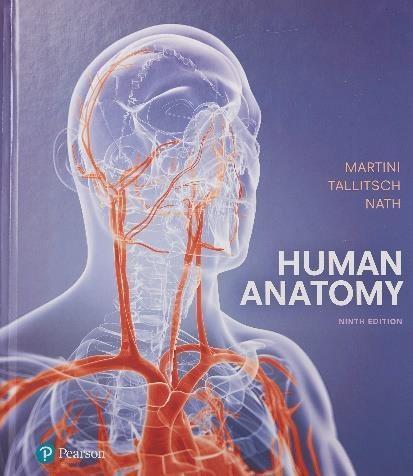Human Anatomy 9th Edition by Martini, Tallitsch, Nath Full Test Bank



1) It is important to studythe discipline ofanatomy because it
A) is important to understand the link between human structureand function
B) develop a three-dimensional understanding of anatomical relationships
C) will assist individuals to make informed decisions about their personal health
D) provides a basis for understanding more advanced courses in anatomy, physiology, andrelated disciplines
E) All ofthe answers are correct.
Answer: E
Learning Outcome: 1.1
Bloom's Taxonomy: 1-2: Remembering/Understanding
2) Whichofthe following statements about anatomical information is correct?
A) Anatomic information is all historical.
B) It describes external and internal structures ofthe body and considers probable function.
C) It addresses large bodystructures visible to the naked eye only.
D) Physiology and anatomy are unrelated.
E) The studyof cells or cytology is useless to anatomy.
Answer: B
Learning Outcome: 1.1
Bloom's Taxonomy: 1-2: Remembering/Understanding
3) The branch of science that studies groups of specialized cells and how they work together is called
A) physiology
B) histology
C) anatomy
D) cytology
E) None ofthe answers are correct.
Answer: B
Learning Outcome: 1.1
Bloom's Taxonomy: 1-2: Remembering/Understanding
4) The analysis of the smallest units of life is called .
A) embryology
B) cytology
C) physiology
D) histology
E) morphology
Answer: B
Learning Outcome: 1.1
Bloom's Taxonomy: 1-2: Remembering/Understanding
5) The discipline that might examine structural interactions within a sheet of muscle tissue, or groupsof specialized cells and cell products that work together to perform specific functions, is
called .
A) morphology
B) radiology
C) embryology
D) histology
E) cytology
Answer: D
Learning Outcome: 1.1
Bloom's Taxonomy: 1-2: Remembering/Understanding
6) The anatomical specialty that refers to the studyof general form (or morphology) and superficial anatomical markings is called .
A) surface anatomy
B) comparative anatomy
C) regional anatomy
D) developmental anatomy
E) systemic anatomy
Answer: A
Learning Outcome: 1.2
Bloom's Taxonomy: 1-2: Remembering/Understanding
7) Which type of anatomy refers to the study of all of the superficial and internal features in a specific area of the body?
A) surface anatomy
B) regional anatomy
C) systemic anatomy
D) gross anatomy
E) microscopic anatomy
Answer: B
Learning Outcome: 1.2
Bloom's Taxonomy: 1-2: Remembering/Understanding
8) The studyof the heart, blood, and blood vessels is which of the following approaches?
A) systemic anatomy
B) regional anatomy
C) developmental anatomy
D) surface anatomy
E) gross anatomy
Answer: A
Learning Outcome: 1.2
Bloom's Taxonomy: 1-2: Remembering/Understanding
Download All Chapters Here: https://nursingrade.com/product/human-anatomy-9th-edition-by-martini-tallitsch-nathtest-bank/
9) The studyofthe early processes during the first two months of development from conception is called .
A) cytology
B) physiology
C) histology
D) embryology
E) osteology
Answer: D
Learning Outcome: 1.3
Bloom's Taxonomy: 1-2: Remembering/Understanding
10) The studyofstructures through specialized imaging techniques, such as ultrasounds, x-rays, or other specialized procedures performed on an intact body, is called .
A) cytology
B) embryology
C) physiology
D) histology
E) radiography
Answer: E
Learning Outcome: 1.3
Bloom's Taxonomy: 1-2: Remembering/Understanding
11) Gross anatomical specialties include _.
A) radiographic and surgical anatomy
B) cytology and embryology
C) histology
D) radiographic anatomy, surgical anatomy, cytology and embryology
E) cytology, histologyand embryology
Answer: A
Learning Outcome: 1.3
Bloom's Taxonomy: 1-2: Remembering/Understanding
12) The studyof anatomical features that mayundergo recognizable pathological changes during illness is called anatomy.
A) clinical
B) developmental
C) comparative
D) systemic
E) regional
Answer: A
Learning Outcome: 1.3
Bloom's Taxonomy: 1-2: Remembering/Understanding
Download All Chapters Here:
https://nursingrade.com/product/human-anatomy-9th-edition-by-martini-tallitsch-nathtest-bank/
13) anatomy is a new subspecialty of gross anatomy as new advances, such as computed tomography and spiral CT scans, have emerged.
A) Surgical
B) Developmental
C) Cross-sectional
D) Regional
E) Comparative Answer: C
Learning Outcome: 1.3
Bloom's Taxonomy: 1-2: Remembering/Understanding
14) Disease is the failure to maintain conditions.
A) metabolic
B) homeostatic
C) allostatic
D) physiological
E) pathological
Answer: B
Learning Outcome: 1.3
Bloom's Taxonomy: 1-2: Remembering/Understanding
15) Which ofthe following is the highest level of organization?
A) chemical
B) organelles
C) cellular
D) tissues
E) organs
Answer: E
Learning Outcome: 1.4
Bloom's Taxonomy: 1-2: Remembering/Understanding
16) The study of disease is .
A) radiology
B) pathology
C) histology
D) neurology
E) cardiology
Answer: B
Learning Outcome: 1.4
Bloom's Taxonomy: 1-2: Remembering/Understanding
Download All Chapters Here: https://nursingrade.com/product/human-anatomy-9th-edition-by-martini-tallitsch-nathtest-bank/